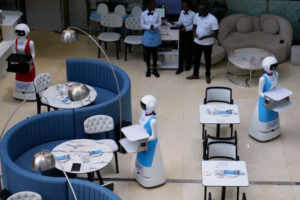
Artificial intelligence (AI) in education has sparked ongoing debates, with educators still defining its role and determining how best to monitor its use. However, new research suggests that AI tools could offer particular benefits to students who struggle with executive functions (EF) like concentration and planning, potentially helping to close performance gaps in the classroom.
A study from Lund University in Sweden has highlighted the potential of generative AI tools, such as ChatGPT, to support students facing challenges with cognitive processes that are essential for academic success. Johan Klarin, the study’s lead author and a school psychologist, explained to Euronews Next, “We found that students with more executive functioning challenges find generative AI tools particularly useful for schoolwork, especially for completing assignments.” This suggests that AI could serve as a valuable aid for students who struggle with focus, planning, and task completion.
Read Related News >>
Exploring the Most Useful AI Web Applications – Transforming Daily Life and Work
The study, published in the journal Frontiers in Artificial Intelligence, involved two separate investigations. The first included 385 students aged 12 to 16 from four primary schools in southern Sweden, while the second focused on 359 students aged 15 to 19 attending the same high school. The results revealed that 14.8% of younger students used generative AI for their education, while over half (52.6%) of the older adolescents relied on these tools. Among AI chatbots, ChatGPT was the most widely used, with 70% of younger and 88.9% of older students utilizing it.
The research found that students who struggled with schoolwork, particularly those facing difficulties with planning, inhibition, and cognitive flexibility, were more likely to turn to AI tools for help. These students often used AI as a compensatory tool to break down complex tasks or overcome challenges in planning. Klarin noted that for students who find it difficult to complete their assignments, “a supportive tool that guides them through the final stages of their work may increase the likelihood of finishing on time.”
However, the researchers also cautioned against the potential risks of over-reliance on AI tools. While AI can assist students in completing tasks, heavy dependence on these technologies may hinder the development of critical cognitive skills, especially during adolescence—a crucial period for the growth of executive functions. Constantly turning to AI as a quick fix rather than learning to navigate challenges could slow or even stunt the natural development of these essential abilities, making it more difficult for students to manage complex tasks in the future.
Klarin emphasized the importance of balancing AI use, stating, “If students rely on generative AI to replace, rather than augment, their existing abilities, this could stunt the growth or even lead to a deterioration of the cognitive skills essential for successfully completing schoolwork.” He also pointed out that executive function skills are not only critical for academic achievement but also play a significant role in broader life outcomes.
As AI continues to advance and becomes more integrated into education, especially for younger students, it is crucial to ensure that these tools enhance rather than hinder cognitive development. Klarin stressed that educators must carefully moderate the use of generative AI, focusing on using it as a supplementary aid rather than a replacement for students’ own skills. “Establishing clear standards and guidelines for the safe and effective use of generative AI in schools should be a top priority,” he said. “Educators and the research community must take a proactive approach to ensure that technological advancements enhance the educational environment rather than hinder it.”








1 thought on “Study Reveals AI Tools Like ChatGPT Are Popular Among Students Struggling with Focus”